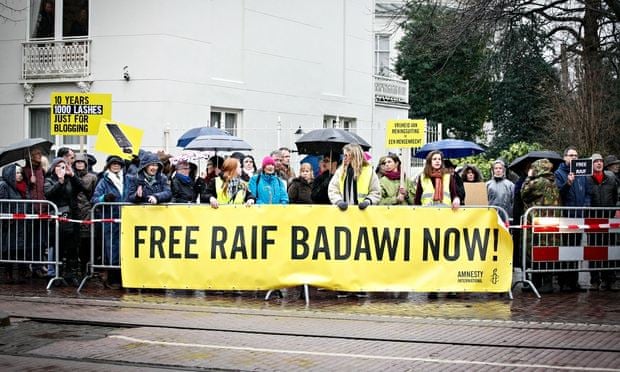The wife of the Saudi blogger Raif Badawi, who was sentenced to 1,000 lashes for criticising leading clerics, says King Abdullah has referred his case to the supreme court amid an international clamour over his flogging.
Ensaf Haidar, who lives in Canada with the couple’s three children, told the BBC the decision had raised hopes that the authorities wanted to end her husband’s punishment. But there has been no official statement from the Saudi government.
The authorities had already postponed Badawi’s flogging on medical grounds after a doctor said wounds from a previous lashing had not healed. Campaigners said the move exposed the “outrageous inhumanity” of his punishment.
The 31-year-old was due to receive 50 further lashes after Friday prayers, the first 50 having been given outside al-Jafali mosque in the port city of Jeddah last week. He was sentenced last May to 10 years in prison, a fine and 1,000 lashes after criticising Saudi Arabia’s powerful clerics on his blog.
According to Amnesty International, which has adopted Badawi as a prisoner of conscience, he was removed from his cell on Friday morning and taken to the prison clinic for a health check. The doctor concluded that the wounds from last week’s flogging had not yet healed properly and Badawi would be unable to withstand more. He recommended that the flogging be postponed until next week.
Said Boumedouha, Amnesty International’s deputy director for the Middle East and North Africa, said: “Not only does this postponement on health grounds expose the utter brutality of this punishment, it underlines its outrageous inhumanity.
“The notion that Raif Badawi must be allowed to heal so that he can suffer this cruel punishment again and again is macabre and outrageous. Flogging should not be carried out under any circumstances.”
The postponement follows widespread international pressure from governments and human rights groups for the Saudi government to halt the punishment. On Thursday, the UN commissioner for human rights appealed to the Saudi king to intervene.
“Flogging is, in my view, at the very least, a form of cruel and inhuman punishment,” said Zeid Ra’ad Al Hussein, who is a member of the Jordanian royal family.
“Such punishment is prohibited under international human rights law, in particular the convention against torture, which Saudi Arabia has ratified. I appeal to the king of Saudi Arabia to exercise his power to halt the public flogging by pardoning Mr Badawi, and to urgently review this type of extraordinarily harsh penalty.”
Badawi’s case was one of several recent prosecutions of activists. On Monday, an appeal court upheld the conviction of Badawi’s lawyer and brother-in-law, Waleed Abu Al-Khair, on charges that included offending the judiciary and founding an unlicensed organisation. Khair’s sentence was extended from 10 to 15 years on appeal.
Vigils were held outside Saudi embassies in Berlin, Paris, The Hague and Tunis on Thursday, and the Canadian government expressed concern at a punishment it described as “a violation of human dignity and freedom of expression”.
The Foreign Office has said it is “seriously concerned” at the flogging. “The UK condemns the use of cruel, inhuman or degrading punishment in all circumstances,” a spokesman said. “We have previously raised Mr Badawi’s case and will do so again directly with the Saudi authorities. The UK is a strong supporter of freedom of expression around the world.”
Expressions of concern have not led to any diplomatic action against Saudi Arabia, which is regularly criticised for its prolific use of the death penalty. On Friday, Murdi al-Shakra became the 10th person to be beheaded this year. He was sentenced to death for murdering fellow tribesman Faraj al-Shakra, the interior ministry said.
On Monday, Laila Bint Abdul Muttalib Basim, a Burmese woman living in Saudi Arabia, was beheaded after being dragged through the street and held down by four police officers. She was convicted of the sexual abuse and murder of her seven-year-old stepdaughter.
Amnesty International has accused the UK government of “wearing the Saudi muzzle” because of its oil, business and strategic interests in the conservative kingdom.
“David Cameron and his ministers should have the courage of their convictions and say – loud and clear – that Raif Badawi’s case is an absolute disgrace, that this weekly flogging should be halted and he should be freed from jail,” said Kate Allen, UK director of Amnesty. “At the very least the Foreign Office should be calling in the Saudi ambassador and telling him this in person if they haven’t already done so.”

No comments:
Post a Comment